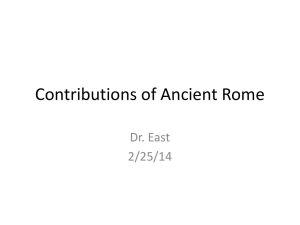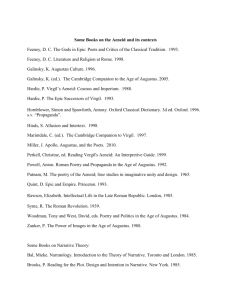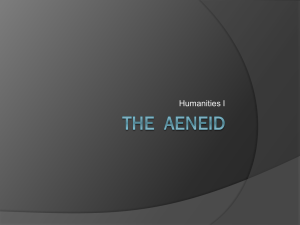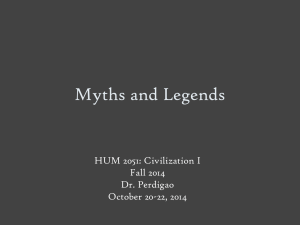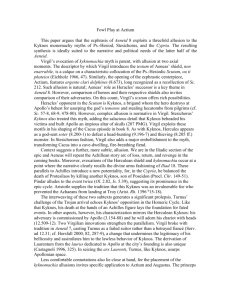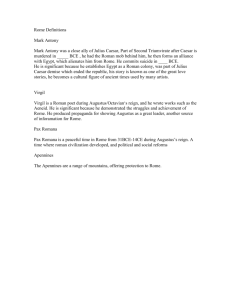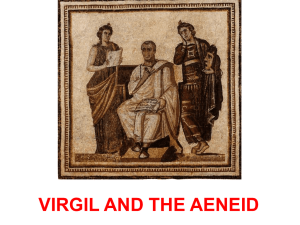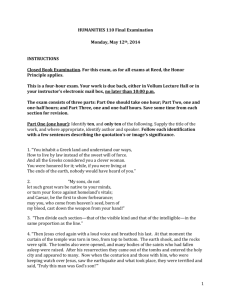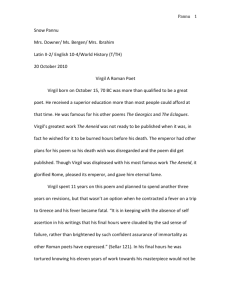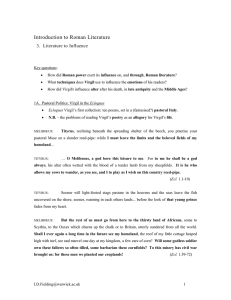投影片 1 - linguae
advertisement
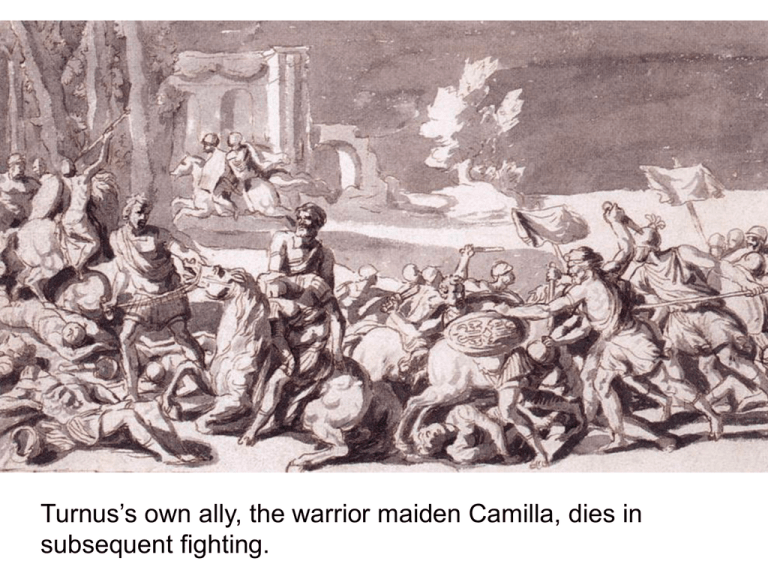
Turnus’s own ally, the warrior maiden Camilla, dies in subsequent fighting. Eventually Aeneas defeats Turnus in single combat and is about to spare his life when, seeing he is wearing a belt taken from Pallas, he tells him that it is Pallas who will now take his revenge: hoc dīcēns ferrum adversō sub pectore condit fervidus. ast illī solvuntur frigore membra vītaque cum gemitū fugit indignāta sub umbrās. VIRGIL THE MAN (from Donatus’s Life of Virgil (4th cent.), quoted by Peter Jones (p.1-2)) • `He was tall and well-built, with a swarthy complexion and the look of a countryman. His health was mixed: he commonly had problems with his throat and stomach, suffered from headaches, and often spat up blood. He ate and drank little.’ • `He was so respectable in life, speech and mind that in Naples he was usually called Parthenias (`Virginia’/`Maiden’); and if anyone recognised him in Rome, he would escape those pointing and following him by taking refuge in the nearest house. He had a house on the Esquiline [one of the Roman hills], next to the garden of Maecenas, though he spent most of his time well out of sight in homes in Campania and sicily,,,He argued a case in court once, and once only. According to Meliissus [a freedman of Maecenas] he was slow in speech, as if he had not been properly trained.’ VERGIL AND HIS MATERIAL • The legend of Aeneas as ancestor of the Romans is mentioned by a Greek historian, Hellanicus. in the 5th century B.C. • Naevius, a southern Italian who served in Rome’s first war against Carthage (264-241)and wrote an epic poem about it, mentions Aeneas and Anchises, Venus’s role as protector of the Trojans and also Queen Dido. • In the 2nd. Century B.C., Ennius set out consciously to write about Roman history with the Greek poet Homer as his model. • As the work of these early writers survives only in fragments, it is uncertain which parts of the plot are Virgil’s own, but he almost certainly invented the love affair between Aeneas and Dido. He also chose to depict Aeneas as escaping in the midst of the fighting in Troy, rather than, as in other versions, leaving before the Greek attack, departing under a compromise with the Greeks, or even betraying the city to them (see the extracts in Peter Jones’ edition, p.298-301). • Virgil also decided that Aeneas should first seek to die in a hopeless fight against the enemy and only later accept the instructions of the ghost of Hector and of his mother, Venus, that his destiny was to survive and found a new Troy in another land. VIRGIL’S METHOD OF WORKING • `He first made a prose sketch off the Aeneid and divided it into twelve books, and then, as the fancy took him, and not following any particular order, turned them bit by bit into poetry. Further, not wishing to lose momentum, he left some passages unfinished and propped up others with temporary verses, joking that they were struts to hold the work up until solid columns were delivered.’ (Donatus (4th cent. A.D.), translated by Peter Jones (pg.3)) • Because he wrote in this way and then died before the poem was finished, there are continuing arguments about which sections of the present text he really wanted to keep and also over whether he would have completed half lines such as Book II 624: nūmina magna deum. VIRGIL’S POLITICAL POSITION • The Aeneid both glorifies Augustus’s supposed ancestor and also portrays the emperor himself as the culmination of Roman history. What were Virgil’s own true feelings? – Was he simply a propagandist for the government that financed him? – Did he genuinely see in Augustus the solution to Rome’s problems – Was he deliberately painting an idealised picture in the hope that Augustus would feel obliged to live up to it? – Or was there in fact a hidden anti-Augustan message in the poem? An implication, for example, that Aeneas’s killing of the defeated Turnus at the end of the poem foreshadowed the killing of political opponents that Augustus had himself been involved in? GREAT EXPECTATIONS • Despite Virgil’s own retiring nature, his work on the Aeneid was public knowledge and the finished poem eagerly anticipated: – `Give way you poets of Greece and Rome: Something greater than the Iliad is in the making’ (Virgil’s contemporary, the poet Propertius – even if this was sarcasm, it shows that some people were already hyping the work. ) – `..when [the audience] heard lines from Virgil quoted during a theatrical performance at which he himself happened to be present, they rose to their feet at once and acclaimed him in the same way as they would Augustus.’ (Tacitus, a historian writing in the late 1st. century A.D.) Virgil recited three books of the Aeneid at court and is seen here reciting the sixth to Augustus and his sister Julia. She is said to have fainted on hearing the reference to the early, tragic death of her son, Marcellus. INTEREA PAVIDAM VOLITANS PINNA TA .VBEM Virgil died in 19 B.C., allegedly leaving instructions that the uncompleted poem should be destroyed. Instead, Augustus ordered its publication and it immediately entered the Roman school curriculum. This writing exercise of around 100 A.D.(perhaps by a child of the commanding officer?) is from from the fort at Vindolanda on the northern frontier of Roman Britain. It is a slightly botched attempt to reproduce Aeneid 9.473: interea pauidam uolitans pinnata per urbem (meanwhile flying on wings through the frightened city..) See http://vindolanda.csad.ox.ac.uk for details Virgil’s work, and particularly the Aeneid, has retained this status ever since, with Virgil himself regarded in the Middle Ages as a sort of pre-Christian saint. In his Divine Comedy, the Italian poet Dante (1265 – 1321) depicted Virgil as his guide in a journey through Hell, Purgatory and to the outskirts of Heaven, During the Middle Ages, Virgil came to be regarded by many ordinary people as a kind of magician and legend had it that he had himself carved out his supposed tomb near Naples just by casting his glance on the rock! From ancient times onwards, there were also those who took a rather cynical view of the epic. This is a wall painting from a house in Pompeii (so dating from the 1st. Century A.D.), depicting Aeneas and his father and son fleeing Troy in the guise of apes! The spirit of parody continues into modern times with an Aeneid `Facebook page’ designed recently by American students Virgil’s devotees were, however, the dominant voice. Among them in the 19th century was the British poet Tennyson, whose tribute to the Roman poet was commissioned by the people of Mantua to mark the 2000th anniversary in 1882 of Virgil’s death in 19 B.C. Before Tennyson himself fell out of favour in Britain, the lines were included in virtually every edition of Virgil’s work produced for British school students. Tennyson’s Lines for Virgil Roman Virgil, thou that singest Ilion's lofty temples robed in fire, Ilion falling, Rome arising, wars, and filial faith, and Dido's pyre; Landscape-lover, lord of language more than he that sang the "Works and Days," All the chosen coin of fancy flashing out from many a golden phrase; Thou that singest wheat and woodland, tilth and vineyard, hive and horse and herd; All the charm of all the Muses often flowering in a lonely word; Poet of the happy Tityrus piping underneath his beechen bowers; Poet of the poet-satyr whom the laughing shepherd bound with flowers; Light among the vanish'd ages; star that gildest yet this phantom shore; Golden branch amid the shadows, kings and realms that pass to rise no more; Now thy Forum roars no longer, fallen every purple Cæsar's dome— Tho' thine ocean-roll of rhythm sound forever of Imperial Rome— Now the Rome of slaves hath perish'd, and the Rome of freemen holds her place, I, from out the Northern Island sunder'd once from all the human race, I salute thee, Mantovano, I that loved thee since my day began, Wielder of the stateliest measure ever moulded by the lips of man.
